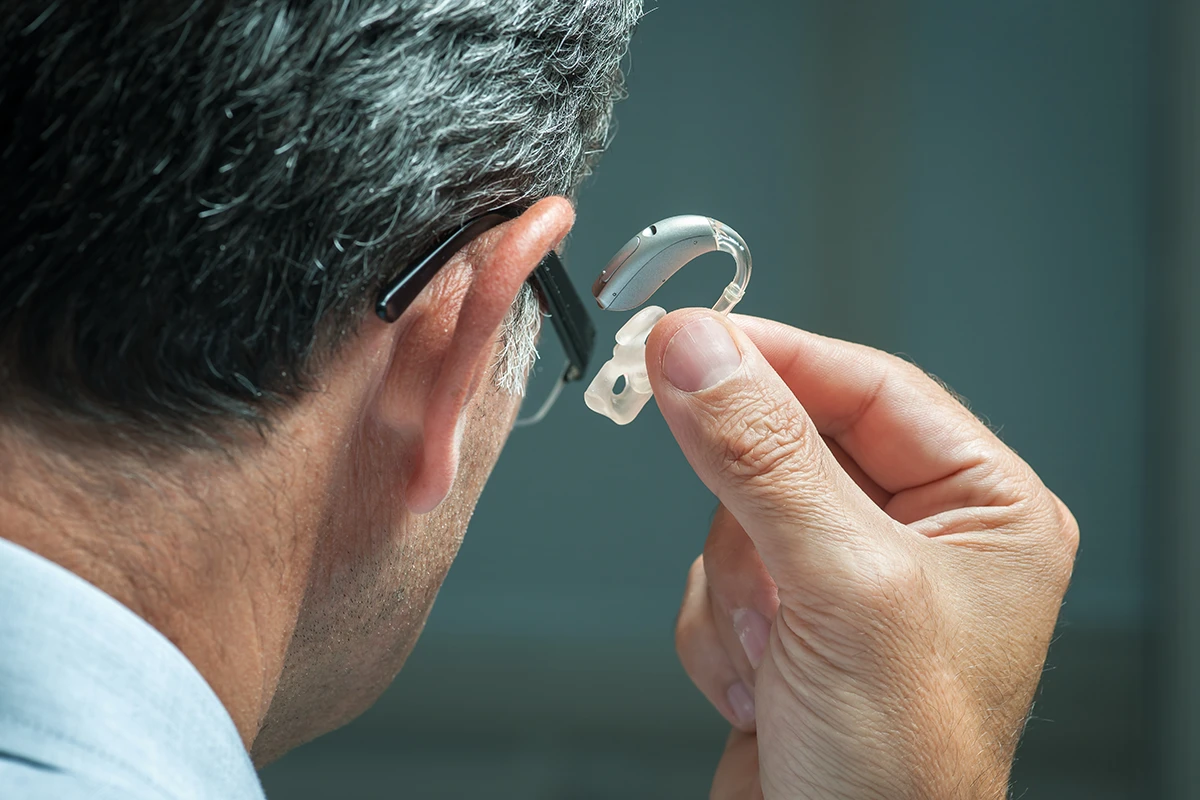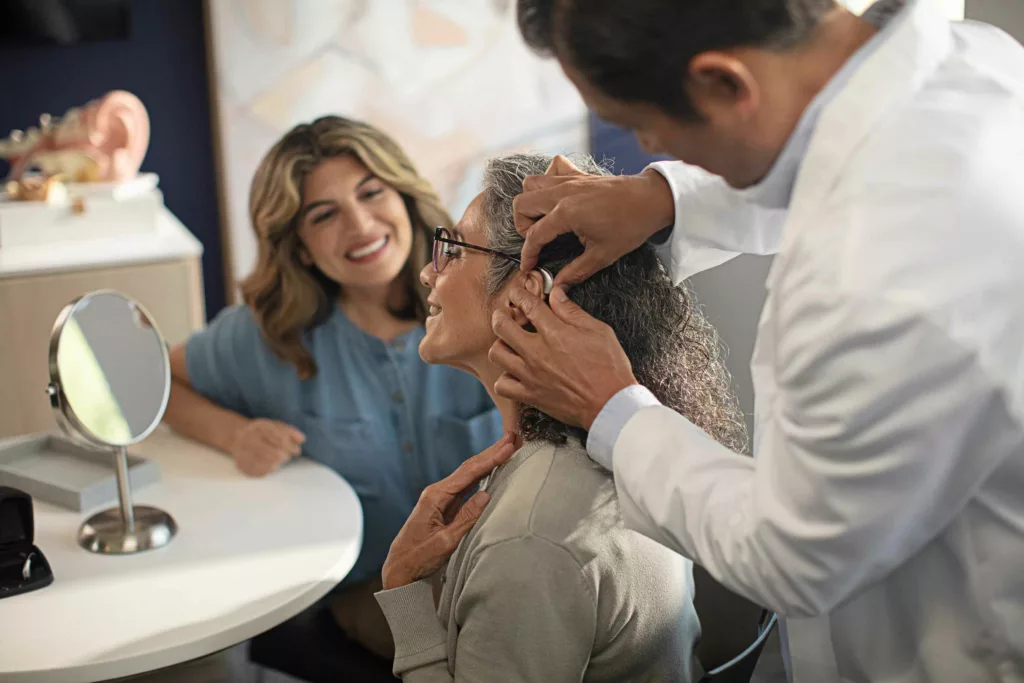
Over-the-Counter Hearing Aids were approved by the Federal Drug Administration (FDA) in October 2022. If you’re exploring treatment options for hearing loss, there are some things you should know about over-the-counter hearing aids, so you can make the most informed decisions regarding your hearing health.
Below, we provide a comprehensive overview of some of the key advantages and disadvantages of OTC hearing aids to help you determine if they are the right solution for you.
Benefits of OTC Hearing Aids

The most basic OTC hearing aid models can be compared to over-the-counter reading glasses for people with declining eyesight. They can be a convenient option for adults over the age of 18 years who have perceived mild to moderate hearing loss and want a simple, quick fix without the need for a prescription.
Lower Price Point
One of the biggest advantages to OTC hearing aids may be the price point. If your financial resources are limited and/or you have no hearing health insurance coverage, OTC hearing devices could be a cost-effective solution for you. According to the National Council on Aging, the average cost for a pair of OTC hearing aids is $1,600. However, you can find some basic models for as low as $400.
Increased Access

With no prescription requirement, OTC hearing aids can be purchased by anyone over the age of 18 anywhere over-the-counter medications are available, like drugstores, big box stores, or online retailers. This can be incredibly beneficial for people who live in rural areas, as their nearest hearing health care clinic may be hours away. However, if you do have a hearing healthcare provider, they may even offer OTC hearing aid options as well. According to Health and Human Services Secretary Xavier Becerra, part of the reason for the FDA’s approval of OTC hearing devices was to drive down prices of hearing aids overall, which is also thought to increase access.
Encourage Use
One of the main reasons behind the FDA’s ruling to make hearing aids available without a prescription was to increase their use. According to the NIDCD Epidemiology and Statistics Program, only about 30% of adults over the age of 70, who could benefit from hearing aids, use them. This report also indicates that only 16% percent of adults 20-69, who could benefit from hearing aids, use them.1
While OTC hearing aids sidestep the professional hearing exam and don’t address all levels of loss, they can be good starting point for new users. Once purchasers enjoy an improvement in their hearing, they may feel encouraged to upgrade to prescription aids, especially when their hearing loss increases beyond the capacity of the OTC model.
Disadvantages of OTC Hearing Aids

While OTC hearing aids may be appropriate for a select few, they may not be for everyone. Nonprescription devices do have some disadvantages when compared to prescription hearing aids and may not provide the best solution for many hearing issues.
Low Functionality
Since the FDA ruling late in 2022, a number of tech companies have quickly moved in to roll out hearing aids with a wide range of features and functionality. However, the additional features drive up the cost of these kinds of OTC hearing aids. To take advantage of the lower price point associated with nonprescription aids, your options are often limited to base models with very little functionality, that only help with amplifying sounds, which is only useful in specific environments.
In addition, to keep the price point low, many over-the-counter aids have the following hearing technology deficiencies:
- No premium sound quality
- No volume limiter (not required by FDA and adjusting too loud could cause more hearing loss)
- No directional microphone to adapt to different situations
- No smartphone app for easy adjustments
- No Bluetooth functionality
- No Telecoil (T-Coil) for connecting to sound in large, specially equipped auditoriums
No Custom-fit Models
Unlike prescription devices, OTC hearing aid models cannot be custom fit to a person’s unique ear shape or hearing requirements. This type of self-fit design can result in discomfort as well as impact the effectiveness and overall user experience. The lack of customization is a significant disadvantage of OTC hearing aids, as every person’s hearing loss is different, and a proper fit is essential for optimal hearing aid performance.
No Professional Hearing Exams or Services

OTC hearing aids are certainly easier to purchase. However, what if your hearing loss is caused from ear wax compaction, which can be addressed without hearing aids, or a tumor that needs medical care? When it comes to taking control of your hearing health, personalized care, coaching, and follow-up are all important.
When you choose OTC hearing aids, you will receive:
- No Ear Health Screening
- No Ear Cleaning
- No In-person, comprehensive hearing test
- No Coaching on use and care
- No Ongoing Hearing Health Monitoring
- No Cleaning and maintenance
- No Follow-up or ongoing adjustments
- No Troubleshooting or Repairs
OTC hearing aids may offer a temporary solution for some, but the lack of care from a specialist may put you at risk of potential frustrations and complications including:
Delayed Medical Treatment
By treating the symptom (hearing loss) without first getting a hearing and ear health exam, a serious condition could be overlooked, such as a tumor, ototoxicity, or neurological issues.
Inadequate Solution
Relying on your perceived level of loss or an online hearing test, you may purchase an OTC hearing aid, when your level of loss actually exceeds its ability. Again, OTC hearing aids only treat mild to moderate hearing loss. In addition, without an exam, you may be treating hearing loss, when it was simply a buildup of ear wax, or a temporary blockage from congestion.
Improper Calibration
Unlike prescription devices, OTC hearing aids are not expertly calibrated to your hearing requirements. Based on a comprehensive test and in-person exam, a hearing health professional can make accurate adjustments to your hearing aids to calibrate them to your exact needs. Your hearing aids will be professionally adjusted for frequency, volume, and different hearing settings. Without proper calibration, OTC hearing aids can’t provide adequate hearing solutions for many users.
Lack of Consumer Protection

Some OTC hearing aid retailers may offer warranties and return policies. However, the FDA does not require OTC hearing aid manufacturers to offer these types of consumer protections. It can be very costly to end up with hearing aids that are the wrong fit, or do not address your level of hearing loss, especially if you can’t get your money back.
Find the Best Hearing Health Care Solutions for You Today
OTC hearing aids may meet the needs of some folks. However, sacrificing the hearing health screening and in-person exam can lead to unpleasant and even potential detrimental outcomes. If you have been having trouble hearing and would like a comprehensive hearing exam by a professional, the hearing healthcare providers at Audibel are here to help. Our specialists understand that you’re not a customer, you’re a patient deserving of personalized care and hearing loss solutions now and for years to come.
1 National Institute on Deafness and Other Communication Disorders’ Quick Statistics About Hearing






Have a question or Comment?